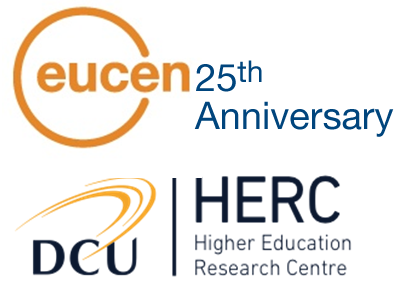
eucen
48th eucen Conference
Dublin, Wednesday 01 – Friday 03 June 2016
Crossing borders through lifelong learning: enhancing quality and equity in higher education
Dublin City University (DCU), the Higher Education Research Centre (HERC) and eucen are glad to present the 48th eucen Conference. The event will take place at Dublin City University, Ireland on 01-03 June 2016. This year's theme is Crossing borders through lifelong learning: enhancing quality and equity in higher education. During the conference we will be celebrating eucen's 25th anniversary. Join us to celebrate!
Participants are invited to contribute papers, workshops and posters, many of which will be published in conference proceedings.
Introduction
Lifelong learning programmes provide bridges for adult students who wish to enter higher education, particularly those from under-represented groups. Education is fundamentally a process of crossing borders: from one level of knowledge to another; from one stage of education to another; between higher education, work and wider life experiences; and from one set of life chances to another. Additionally, in the current context of significant migration flows, the issue of supporting lifelong learning for those crossing physical borders also presents a particular challenge to which higher education needs to respond.
The eucen Conference 2016 thus seeks to open up a cross European dialogue about enhanced 'border crossings' to improve higher education access for a wide range of new groups of adult learners.
Aims of conference/ Target Audience:
The conference will provide a platform for continuing education teachers, professors, managers, researchers and practitioners who seek to widen engagement, promote innovation and break down barriers by crossing borders in university lifelong learning. It will also seek to stimulate dialogue and debate with a view to developing new solutions to engagement with adult learners at local, national and international levels.
Themes
Participants are invited to consider a range of concerns around the theme of crossing borders. We welcome proposals for three types of contributions: (i) papers; (ii) workshops; and (iii) posters. Topics may include, but are not limited to case studies, reports on research and presentations of practice that consider:
◾ How do traditions and perspectives of adult education contribute to the discussion of lifelong learning in contemporary higher education?
◾ In the face of high levels of migration – reflecting both the economic and refugee crises – how can the participation of students across national and international boundaries be enhanced in ways that contribute to meaningful lifelong learning?
◾ What type of support or professional development do teachers, trainers and other higher education professionals need to enable them to work across various organizational, pedagogical, cultural, or identity borders?
◾ What do we know about the impact of higher education lifelong learning programmes that are specifically designed to cross borders by bringing new collaborators into our university communities? These might be programmes that are delivered in the community, or online. What indicators matter for such programmes and how should they be measured?
◾ What are the policy implications of an interest in border crossing? Diversity is an educational advantage but what might this mean for policy advisors, developers, implementors, practitioners, funders and evaluators?
◾ How can partnerships and innovations support efforts to cross borders between education and employers, and between lifelong learning and other social engagement activities of the university?
◾ How can we evaluate the impact of higher education lifelong learning programmes that cross borders? What indicators matter and how might they be measured?
Submission Procedure
Colleagues are invited to submit an abstract (500 words) using the submission form available on eucen website http://dublin2016.eucen.eu/call-for-contributions/, indicating whether they are proposing to: (i) present a paper; (ii) run a workshop; or (iii) display a poster.
As requested in the form, the abstract should provide: (a) the title (b) author (s) with email contact detail (if there is more than one author, please identify one as the lead contact point); and (c) outline the topic of the presentation. All submitted proposals will be reviewed by the eucen Conference Scientific Committee, which reserves the right to change the form of presenting the authors' work.
Important Dates
10 March 2016: Proposal submission deadline
20 March 2016: Conclusion of review and notification of result to authors
15 April 2016: Deadline for presenter registration
01 June 2016: Conference commences
Further details of programme and registration are available on eucen website http://dublin2016.eucen.eu/
